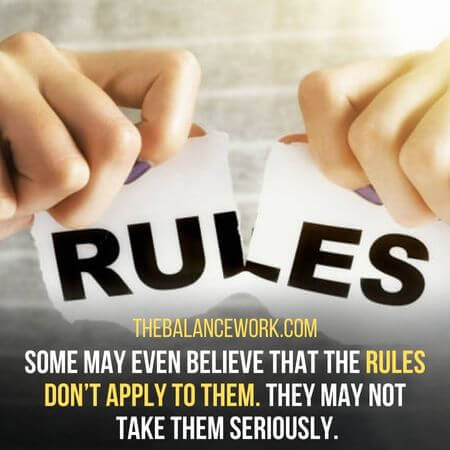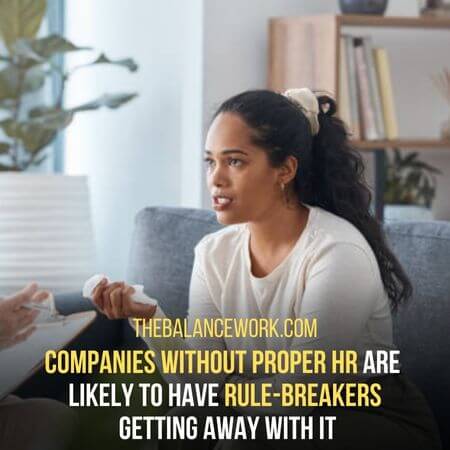Coworkers break the rules and get away with it; this is one of the most frustrating work experiences imaginable.
It’s an issue that many employees deal with. But knowing how to handle it in a way that won’t cause even more conflict or hurt morale can be hard.
Why Coworkers Break the Rules & Get Away With It
Rule-breaking is rarely done out of maliciousness or malice. So there can be many reasons coworkers break the rules and get away with it.
1. Lack Of Knowledge:
Employees may not know the rules, or they may forget them. They may take shortcuts without understanding how and why certain rules apply to their situation.

This can end up in rule–breaking without even realizing it. With any new job or task, it’s important to ensure employees have the necessary knowledge and understanding of the rules to succeed.
Some coworkers may also think that if they get away with it once, they will be able to continue doing so without consequence.
Some may even believe that the rules don’t apply to them. And, even if they are aware of the rules, they may not take them seriously.
2. Cutting Corners:
When there is a tight deadline, some coworkers may take shortcuts. They will try to achieve the desired outcome quicker.
This could lead employees to break certain rules and regulations. No matter the task, it’s important to remind workers of the importance of all rules and regulations.
Cutting corners could lead to undesired results or consequences such as disciplinary action.
If not reprimanded, workers may continue to break the rules and get away with them. It can lead to a lack of integrity and reliability in the workplace.
3. Feeling Like No One is Watching:
Some supervisors, bosses, or managers are not paying attention to the tasks. Thus, some employees may find it easier to break the rules without fear of getting caught.
This feeling of no one watching can be a major reason why coworkers get away with rule-breaking.
Everyone in the organization must understand that their actions are constantly being monitored. It can help create a workplace culture of accountability and integrity.
When coworkers know they are being watched, they will be less likely to break the rules.
4. Not Understanding How Rules & Regulations Apply:
All workers need to understand the rules and regulations that are in place. This can help to reduce the likelihood of rule–breaking by coworkers.
No matter how well-intentioned, an employee may not understand how the rules apply,
Then they could end up making a mistake or breaking the rules.
5. Believing They Will Get Away With It:
If an employee gets away with breaking the rules once, they may be more likely to do it again.
Any time someone believes they can get away with breaking the rules, it puts a company at risk.
A belief that they can get away with it may come from a lack of enforcement or oversight. Or it could simply be a feeling that no one is watching.
Enforce the rules to discourage this type of rule-breaking behavior. Ensure that everyone follows the standards set by the company.
Ultimately, breaking the rules will only hurt a business and its employees in the long run.
6. Favoritism:
Favoritism can create an environment where employees can break the rules without consequence.

When one employee gets favor over another, the favored employee may feel like they can act without fear of punishment.
Favoritism is unfair to everyone involved and should be avoided at all costs. Any instance of favoritism should get reported immediately and dealt with swiftly.
7. Nepotism:
When a family works at a business, it can create a hostile environment. Rules get broken without consequence.
Family members may feel like they can do whatever they want. They take advantage of their relationship with the employer.
It’s important to ensure all employees have the same standards regardless of family ties. And ensure that any instances of nepotism get reported and dealt with.
No matter how much you like a family member, they should still follow the same rules as everyone else.
8. Leadership Failure:
Leaders must lead by example and ensure that all employees follow the rules. If leaders fail to do this, it can create an atmosphere. Employees feel like they can get away with breaking the rules.
This environment can easily lead to a culture of unprofessionalism and low morale.
Employees look up to their leaders. So when they see them getting away with breaking the rules, it can perpetuate a cycle of rule-breaking.
Leaders must be accountable for their actions and consistently enforce rules. That way, employees will understand that breaking the rules is not acceptable.
9. In-disciplined Company:
Some companies are not tough on rule-breakers but instead focus on the bottom line.
These companies can become lenient when enforcing rules. It allows employees to get away with more than they should.
This lack of discipline can lead to an unproductive workplace. It can demoralize employees who feel their hard work goes unrecognized or unrewarded.
Some employees may even feel that the rules don’t apply to them, and their bad behavior will continue.
10. No Proper Human Resources Management:
Companies without proper HR are likely to have rule-breakers getting away with it. Proper HR practices make it easier to identify and address rule-breaking behavior.

There may not be a clear policy for employees who break the rules or any consequences for their actions.
And there is no process of following up on complaints to ensure that the issue subsides.
What To Do If Coworkers Break the Rules & Get Away With It
If a coworker is getting away with breaking the rules, discourage this type of behavior:
1. Awareness:
Raising awareness about the rules will help ensure everyone knows their roles. All employees should be familiar with the company policies. They must adhere to any relevant regulations that may apply to their job.
There are ways to ensure that everyone is aware of the rules. Start with a company–wide meeting to discuss the rules and answer questions.
Also, post a copy of the policies in common areas so that they are easily accessible.
2. Supervision:
It’s important to keep an eye on the behavior of all employees. Supervisors should be on the lookout for any inappropriate behavior. And they should correct it immediately if necessary.
If an employee consistently breaks the rules, it may be time to take disciplinary action.
Any form of discipline should be in a respectful but firm way. And it should always have documentation.
3. Consequences:
When rules get broken, consequences should match the severity of the offense. Consequences should be fair but also serve as a deterrent for future rule-breaking. The consequences could range be verbal warnings.
Or they could be suspensions and even terminations, depending on the situation. Employers need to make sure the consequences are consistent.

This way, employees understand the seriousness of the situation. By taking the appropriate action, employers can help create a workplace culture. They can boost respect and accountability.
4. Monitoring:
Employers need to monitor their employees regularly. This will help ensure that the rules get followed. This way, any violations will get identified quickly.
Regular meetings could discuss expectations and ensure everyone is on the same page.
Employers should also review employee performance data. They must identify any trends in rule violations.
Employers can prevent coworkers from breaking the rules by keeping a close eye.
5. Rewarding Good Behavior:
In addition to monitoring their employees, employers should also reward good behavior.
Recognizing employees for following the rules can help to reinforce positive behaviors. It can discourage rule-breaking.
Rewarding employees for their hard work can also create a positive work culture. It encourages rules to get followed.
By rewarding, employers can ensure that their employees are following the rules. And they are also actively striving to do their best.
6. Follow-Ups:
Employers should develop a follow–up process to ensure that the rules get followed. This can involve checking in with employees to ensure they follow the rules.
Ensure setting up regular reviews and check-ins with supervisors. This will allow employers to identify any potential rule-breaking and address it.

It’s also important to proactively address any issues that arise as soon as possible.
7. Open Communication:
When it comes to rules, communication is key. Make sure there is an open and honest dialogue between employers and employees.
This could involve setting up meetings or training sessions. Also, employees should feel comfortable asking questions if they don’t understand the rules.
8. Invest in Technology:
Technology can help employers monitor their employee’s behaviors more closely. For example, an employee wastes time on the job.
Technology can help employers detect this and take appropriate action. Some companies use software to track employees’ time and attendance.
They monitor Internet usage and even flag violations. Also, video cameras can be used to monitor employee activities.
Technology can help employers create a more secure and safe work environment.
Final Word:
Coworkers may break the rules and get away with them from time to time. But employers should take proactive steps. They must ensure that their employees follow the established guidelines.
By taking a proactive approach, employers can encourage good workplace behavior. They can reduce instances of rule-breaking.
This can help create a positive work environment. It can ensure everyone follows the same standards.
Last Updated on 1 day by Shahzaib Arshad
- Why Does My Boss Wink At Me? 6 Potential Reasons - October 5, 2023
- Is It Legal For Your Employer To Call Your Doctor? No, But… - October 4, 2023
- 12 Ways To Deal With A Low IQ Person - September 22, 2023